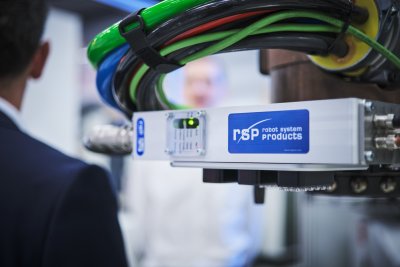Robots need accessories to work efficiently. But what’s the easiest way to connect the accessories to factory networks? The easiest way is to use HMS Networks’ ready-made Anybus products, as RSP found out.
 Connecting Robot Accessories to Any Industrial Network
Connecting Robot Accessories to Any Industrial Network

Connecting Robot Accessories to Any Industrial Network
Case Study from | HMS Industrial Networks Inc
The number of industrial robots operating in factories worldwide continues to rise. To use robots efficiently and maximize productivity, companies attach robot accessories to the robots to enable the robots to perform different tasks.
RSP specializes in developing, producing, and installing the required robot accessories. When RSP started to develop a new range of tool changers, they needed to meet their customers’ expectations and provide a tool changer capable of connecting to the factory networks. However, developing the required networking technology is a complicated task outside RSP’s expertise. Happily for everyone, RSP found Anybus solutions from HMS. HMS helped embed an Anybus communication interface into the tool changer enabling connectivity with the factory’s network and allowing RSP to remain focused on making world-leading robot accessories.
Robot System Products
Robot System Products (RSP) specialize in making industrial robot accessories that are used in factories worldwide. “Our strength lies in the specialized knowledge gained from working with industrial robotics for almost 20 years,” explains Henrik Hofström, marketing manager at RSP. “This specialized knowledge enables us to make robust, versatile industrial robot accessories that help our customers improve robot flexibility and increase productivity.”
One of RSP’s main product ranges is its tool changers. A tool changer is attached to a robot and enables the robot to change the tool quickly and safely.
One of RSP’s main product ranges is its tool changers. A tool changer is attached to a robot and enables the robot to change the tool quickly and safely.

The Moduflex tool changer is attached to the robot enabling the robot to change tools quickly and safely.
Challenge
The requirements for a smart and connected industry affect every step in the automation process. So, when RSP was developing its Moduflex series, a new line of tool changers specially designed to carry heavy payloads, they needed to move with the times and provide a modern tool changer that could connect to automation networks.
However, developing the required networking technology is neither easy nor what has made RSP a global leader. “We’re experts in robotics, not industrial networking,” explains Mats Thunell, senior engineer at RSP. “We want to remain focused on robotics, so we didn’t want to invest the time and money to develop an in-house networking solution as that’s outside our area of expertise. Fortunately, we found a good solution with Anybus that allows both companies to focus on what they’re good at, Robotics for us and networking for Anybus.”
But before we describe the networking solution, let’s set out RSP’s requirements.
However, developing the required networking technology is neither easy nor what has made RSP a global leader. “We’re experts in robotics, not industrial networking,” explains Mats Thunell, senior engineer at RSP. “We want to remain focused on robotics, so we didn’t want to invest the time and money to develop an in-house networking solution as that’s outside our area of expertise. Fortunately, we found a good solution with Anybus that allows both companies to focus on what they’re good at, Robotics for us and networking for Anybus.”
But before we describe the networking solution, let’s set out RSP’s requirements.
RSP’s networking requirements
Robots move freely within the factory, so robot accessories must be as compact and cable-free as possible. To maintain the tool changer’s compact form, RSP preferred to embed the networking technology within the tool changer. RSP also needed a data communication interface that allowed easy and reliable connectivity to any factory system, regardless of the network protocol.

Henrik Hofström at RSP and Samuel Alexandersson at HMS.
Anybus CompactCom
The Anybus CompactCom matched all the networking requirements.
Embedded design
To maintain the tool changer’s compact size and avoid extra cables, RSP chose the Anybus CompactCom B40. The Anybus CompactCom B40 was attached to the tool changer’s printed circuit board (PCB).
Any network
There’s a CompactCom for any major Fieldbus or industrial Ethernet, and it’s easy to swap one CompactCom for another CompactCom, enabling RSP to connect to any factory system, regardless of the network protocol. As Henrik observes, this opens the possibility of expanding into new markets. “We’ve started with PROFINET, but we can target new markets as there’s an Anybus CompactCom for all major networks.”
Easy and reliable
Anybus CompactCom is ready-made and easy to install, reducing the time to market for new products. The award-winning Anybus NP40 industrial network processor ensures that the CompactCom meets demanding performance, reliability, and security requirements.
“We would not have been able to develop the Moduflex series this easily without the Anybus CompactCom,” concludes Henrik. “The Anybus CompactCom is a great product. It provides reliable industrial network communication and is easy to use.”
“We would not have been able to develop the Moduflex series this easily without the Anybus CompactCom,” concludes Henrik. “The Anybus CompactCom is a great product. It provides reliable industrial network communication and is easy to use.”
Learn more at www.anybus.com or www.robotsystemproducts.com
The content & opinions in this article are the author’s and do not necessarily represent the views of RoboticsTomorrow
Comments (0)
This post does not have any comments. Be the first to leave a comment below.
Featured Product

Harmonic Drive - HPG-R Drive Trains for AMR / AGV
The Harmonic Gearhead® gearbox design allows for backdrivability while ensuring high efficiency performance, maximizing elapsed operational time before recharging is necessary. High-capacity cross roller bearing supports heavy payloads.
